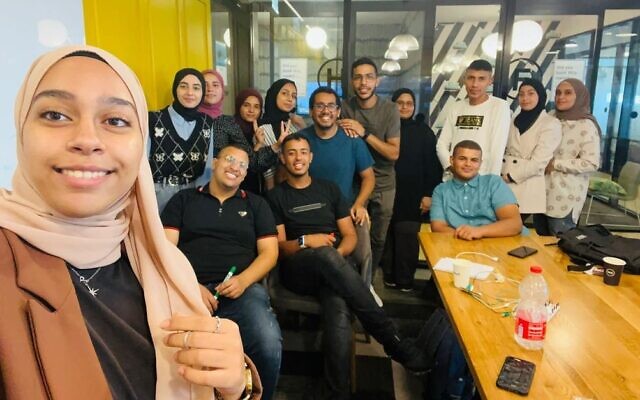Davis Projects for Peace Fellowship Featured in The Times of Israel!
Summer 2022 Davis Projects for Peace Fellow Mohamed Mohamed ’22 (Course 16) worked in collaboration with the BGUrban Lab. The Lab and its affiliates are deeply embedded in issues facing the Bedouin community. They involve urban planners as well as social scientists that have spent decades working on equity and rights issues in the Negev. Their work is helping advance equity and inclusion of all communities in the region, and it will be an honor to continue working with them. Together, Mohamed and colleagues worked with the Bedouin community in delivering the “CitizenTent” project. This was inspired by workshops in the UK using the “Bristol Approach,” which aimed at a citizen-led “smart city” workshop to cultivate projects that the residents formulate. In designing this CitizenTent, they worked with BGUrban Lab affiliates and Bedouin community leaders with who they already have relationships in creating an effective project. The course involved multi-week programming where participants learned about digital citizenship/digital.

A “Bedouin Moovit” bus app, a nanodevice for tracking plant health, and a smart bracelet that helps those with vision impairments avoid obstacles were among the final projects developed this summer by a group of Bedouin teenagers in the Negev region as part of a new tech training program specifically for Bedouin youth.
Over a dozen Bedouin teens were selected for the five-week boot camp, dubbed “Digital Tent,” a collaboration between the Massachusetts Institute of Technology, Ben-Gurion University of the Negev, and Siraj, a non-profit organization dedicated to integrating members of the Bedouin community into Israel’s celebrated high-tech sector with its coveted high salaries.
The local tech industry is made up mostly of secular, Jewish men who served in the Israeli army, while women and members of ultra-Orthodox and Arab communities are severely under-represented. Israel’s Bedouin population numbers around 200,000 and is part of Israel’s Arab minority, itself about 20% of the whole population, but just around 3.5% of the tech workforce.
A minority within a minority, Bedouin communities are among the most disadvantaged groups in the country, and suffer from a chronic lack of infrastructure like water systems, electricity grids, and roads, have inadequate access to quality education and healthcare, and often rank low on socio-economic scales among Israeli localities. Most live in the Negev area in a mix of towns and villages, some of them unrecognized by the state. A scathing State Comptroller report released last year said Bedouin communities in the south live with a shocking lack of services and governance and blamed the state, in part.
Siraj (“a source of light” in Arabic) was founded in 2017 by Israeli entrepreneurs and academics to expose Bedouin teens and youths to advanced technologies and spark their interest in fields like programming and software development. The organization has since launched Siraj Technologies, a sister company that offers solutions in the Internet of Things (IoT) space and provides job opportunities to Bedouin university graduates.
Together with MIT and Ben-Gurion University, the organizations established Digital Tent with a first training camp this past summer, which wrapped up last month. The program worked with 17 Bedouin teenagers and youths, aged 16-20, who were screened for their mathematical abilities and entrepreneurial skills. They took classes on programming languages, project management, and product management and were led by a London-based, MIT computer science graduate who is currently working at Ben-Gurion University’s urban planning laboratory.
Click here to read the full article on The Times of Israel
Tags: Fellowships Summer 2022, PKG Fellowships, Summer 2022, Tech for Good
